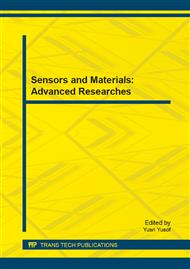p.153
p.157
p.161
p.167
p.172
p.177
p.181
p.185
p.189
A Multi-Agent Scheme for Real-Time Fact Mapping of Reasoning Engine
Abstract:
Physical world facts must be measured and translated into first-order-logic expression before participate the reasoning process in reasoning engine. However, mapping facts into first-order-logic form in real-time is not an easy task. This paper discusses the difficulties of such mapping in three aspects. Then, this paper proposes a multi-agent based scheme to solve these three problems. First, this paper introduces multi-agent frame to reduce system design complexity. Then, this paper proposes a table mapping algorithm to translate numeric facts into first-order-logic form. After that, a resampling mechanism considering overall system delay is introduced to selectively remove excessive facts. Finally, this paper gives a case study, which verifies that the scheme proposed in this paper is practical, efficient and easy to put into application.
Info:
Periodical:
Pages:
172-176
DOI:
Citation:
Online since:
May 2014
Authors:
Keywords:
Price:
Сopyright:
© 2014 Trans Tech Publications Ltd. All Rights Reserved
Share:
Citation:


